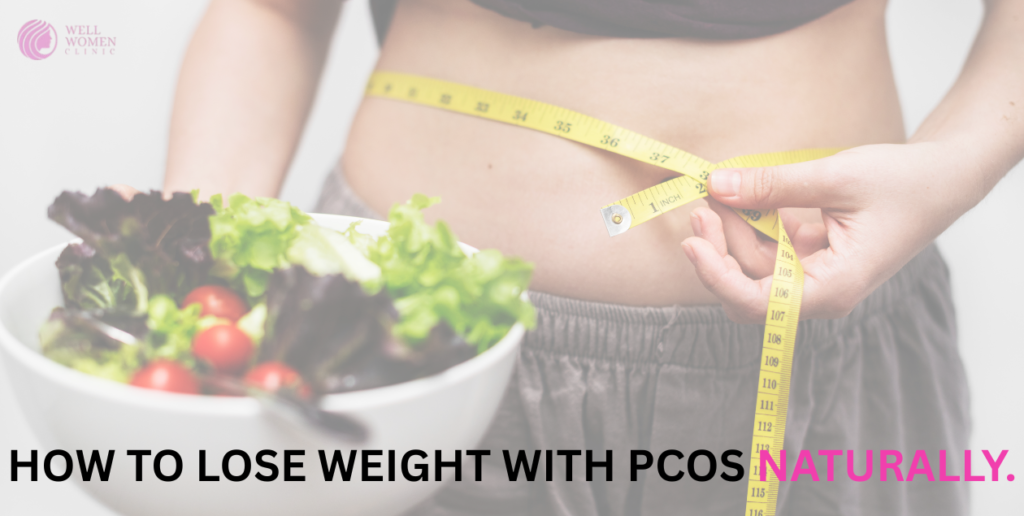This blog offers practical, natural strategies to support weight loss with PCOS, focusing on diet, exercise, stress management, and hormonal balance. Readers will gain sustainable, science-backed tips tailored to the unique challenges of managing PCOS.
Polycystic Ovary Syndrome (PCOS) is a common hormonal disorder that affects many women, often making weight loss a challenging and frustrating experience. If you’ve been diagnosed with PCOS, you’re likely already aware of how stubborn the scale can be — even when you’re doing “everything right.” But here’s the good news: natural weight loss with PCOS is possible, and it doesn’t have to involve extreme dieting or punishing workout regimes. It starts with understanding your body, your hormones, and creating small but sustainable shifts in lifestyle.
In this blog, we’ll walk through practical, natural ways to support your weight loss journey — no gimmicks, just science-backed and holistic methods.
Understanding Why Weight Loss Is Harder with PCOS
Before diving into solutions, it helps to understand the problem. Women with PCOS often have higher levels of insulin — a hormone that helps regulate blood sugar. Insulin resistance, common in PCOS, means your body doesn’t respond to insulin effectively. As a result, your body produces even more insulin, which can lead to increased fat storage and intense sugar cravings.
Additionally, PCOS can affect hunger-regulating hormones and disrupt your metabolism, making it harder to lose weight compared to those without the condition. But this doesn’t mean you’re stuck — it just means your body needs a more tailored approach.
1. Focus on Whole, Low-Glycemic Foods
One of the most powerful PCOS weight loss tips is to reduce your intake of high-glycemic foods that spike insulin and increase fat storage. Instead, go for low-glycemic options that help stabilize your blood sugar levels.
Here’s what that might look like on your plate:
- Replace white rice with healthier alternatives like quinoa or brown rice.
- Select whole fruits such as berries rather than drinking fruit juices.
- Incorporate fiber-dense vegetables into all your meals.
- Choose steel-cut oats over quick-cooking or instant oatmeal for better nutrition.
Eating whole foods in their most natural state not only helps regulate insulin but also supports digestion and energy levels throughout the day.
2. Prioritize Protein and Healthy Fats
A PCOS-friendly diet isn’t about cutting calories dramatically — it’s about choosing the right foods. Prioritize lean proteins (like eggs, tofu, chicken, or legumes) and pair them with healthy fats (like avocado, olive oil, and nuts) to feel full for longer and prevent blood sugar crashes.
These combinations help reduce cravings and stabilize hormones, making it easier to manage weight naturally.
3. Move Your Body — But Smartly
Exercise is crucial, but with PCOS, more isn’t always better. Chronic cardio or intense HIIT sessions can sometimes spike cortisol (the stress hormone), which may further aggravate hormonal imbalances.
Instead, consider incorporating low-impact, consistent movement that supports both physical and emotional well-being. This includes:
- Engage in strength training to enhance muscle mass and boost insulin response.
- Include activities like walking, swimming, or biking for overall fitness.
- Practice yoga or Pilates to reduce stress and increase flexibility.
- Gentle interval workouts with rest periods
Staying active with regular exercise for PCOS can help manage symptoms, support hormonal balance, and improve overall well-being.
4. Support Gut Health
Emerging research shows a connection between gut health and PCOS symptoms. A diverse gut microbiome helps regulate hormones, improve insulin response, and support weight loss.
To boost gut health:
- Eat fermented foods like kimchi, sauerkraut, and Greek yogurt
- Add foods high in prebiotics to your diet, such as bananas, garlic, and onions.
- Consider a high-quality probiotic supplement (consult your GP first)
A healthy gut doesn’t just help with digestion — it also plays a critical role in mood, metabolism, and inflammation.
5. Treat Stress Management as a Top Priority—Because It Truly Matters
High stress levels increase cortisol, which can interfere with insulin function and contribute to weight gain — especially around the belly. If you have PCOS, your body is extra sensitive to stress, so managing it isn’t just good for your mental health; it’s essential for hormonal balance.
Practical ways to manage stress:
- Prioritize 7–9 hours of quality sleep
- Meditate or practice mindfulness daily
- Try deep breathing exercises during breaks
- Set digital boundaries — less screen time before bed can improve sleep quality
A consistent wind-down routine can work wonders for your hormones and waistline.
6. Rethink Your Relationship with Calories
A widespread myth is that just cutting back on food is enough to fix weight issues. But with PCOS, under-eating can cause more harm than good. Severe calorie restriction may lead to more hormonal imbalances, nutrient deficiencies, and rebound weight gain.
Instead of counting calories obsessively, focus on eating mindfully:
- Listen to hunger cues
- Eat slowly and without distractions
- Don’t skip meals, especially breakfast
- Stay hydrated — your body can confuse thirst with hunger.
Sustainable weight loss comes from nourishing your body, not punishing it.
7. Track Progress Beyond the Scale
Weight loss with PCOS doesn’t always show up on the scale right away, and that’s okay. Hormonal shifts take time, and your body might be healing internally long before external changes become visible.
Track other signs of progress:
- Improved energy levels
- Better sleep quality
- Regular menstrual cycles
- Reduced cravings or mood swings
- Improved skin or reduced hair growth
Celebrate these non-scale victories — they matter more than you think.
A Natural, Holistic Path Forward
Losing weight naturally with PCOS isn’t about perfection or rapid results — it’s about consistency, self-awareness, and patience. Each woman experiences PCOS differently, and a solution that helps one person might not be effective for someone else. The key is to stay informed, listen to your body, and adopt changes that feel supportive, not restrictive.
With the right approach, natural weight loss isn’t just possible — it’s sustainable and empowering. Begin with your current situation, take small steps, and gradually build progress. Over time, your body will respond — not just in how it looks, but in how you feel every day.
Searching for a trusted private gynaecologist in Harrow Well Women Clinic provides comprehensive, personalized care for PCOS, hormonal balance, and weight management—offering tailored solutions like dietary guidance and customized fitness plans to support your well-being.





